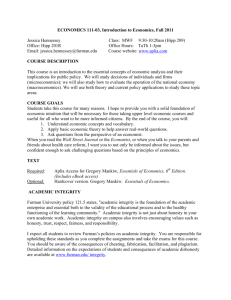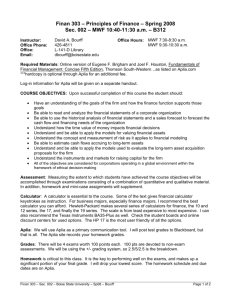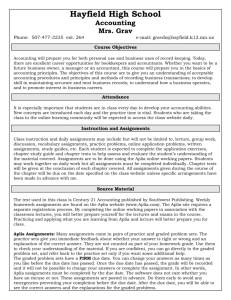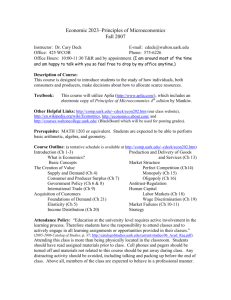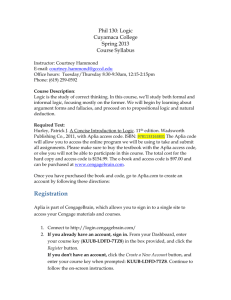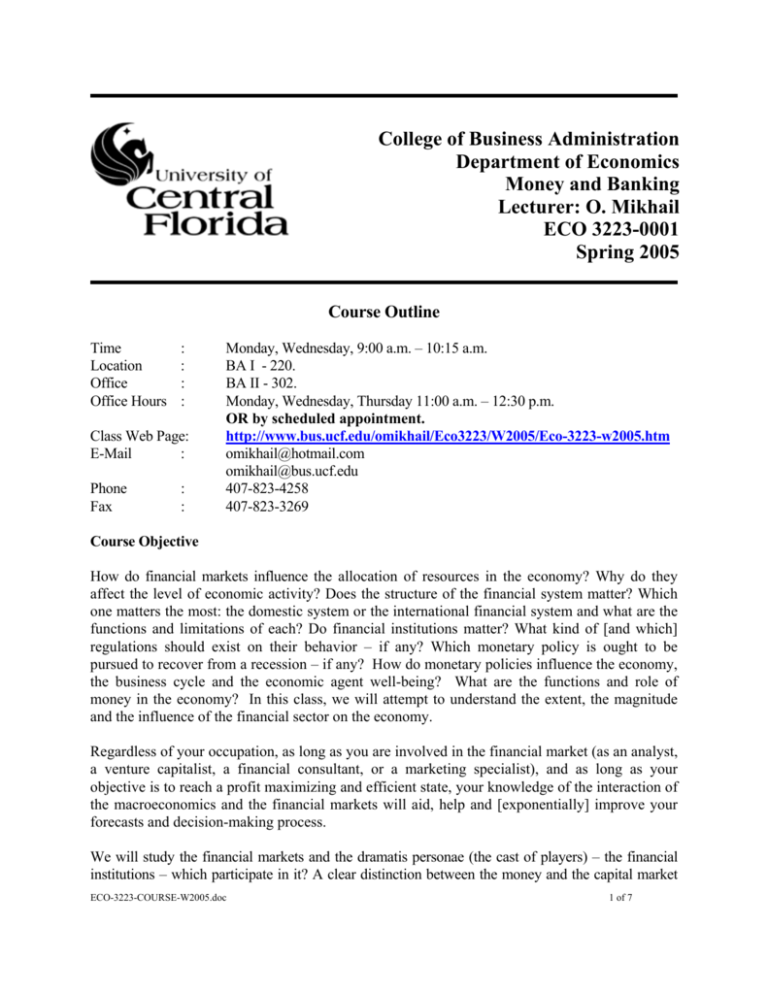
College of Business Administration
Department of Economics
Money and Banking
Lecturer: O. Mikhail
ECO 3223-0001
Spring 2005
Course Outline
Time
Location
Office
Office Hours
:
:
:
:
Class Web Page:
E-Mail
:
Phone
Fax
:
:
Monday, Wednesday, 9:00 a.m. – 10:15 a.m.
BA I - 220.
BA II - 302.
Monday, Wednesday, Thursday 11:00 a.m. – 12:30 p.m.
OR by scheduled appointment.
http://www.bus.ucf.edu/omikhail/Eco3223/W2005/Eco-3223-w2005.htm
omikhail@hotmail.com
omikhail@bus.ucf.edu
407-823-4258
407-823-3269
Course Objective
How do financial markets influence the allocation of resources in the economy? Why do they
affect the level of economic activity? Does the structure of the financial system matter? Which
one matters the most: the domestic system or the international financial system and what are the
functions and limitations of each? Do financial institutions matter? What kind of [and which]
regulations should exist on their behavior – if any? Which monetary policy is ought to be
pursued to recover from a recession – if any? How do monetary policies influence the economy,
the business cycle and the economic agent well-being? What are the functions and role of
money in the economy? In this class, we will attempt to understand the extent, the magnitude
and the influence of the financial sector on the economy.
Regardless of your occupation, as long as you are involved in the financial market (as an analyst,
a venture capitalist, a financial consultant, or a marketing specialist), and as long as your
objective is to reach a profit maximizing and efficient state, your knowledge of the interaction of
the macroeconomics and the financial markets will aid, help and [exponentially] improve your
forecasts and decision-making process.
We will study the financial markets and the dramatis personae (the cast of players) – the financial
institutions – which participate in it? A clear distinction between the money and the capital market
ECO-3223-COURSE-W2005.doc
1 of 7
will be developed. Also, we will study the characteristics, history, powers and objectives of the
central bank as a powerful financial institution.
Briefly, we will study and focus on the following:
1. Overview of the financial system,
2. Interest rates,
3. Financial institutions,
4. The Central Bank (The Fed), and
5. Monetary policy.
By the end of the class, students should be able to understand and explain the nature and
functions of money by comparing the characteristics of a barter economy and a monetary
economy. Students should also be able to understand and explain what financial intermediation
is and how it improves the performance of the economy. Furthermore, students are expected to
understand and explain the principles underlying the determination of interest rates, money
supply, money demand and most of all the mechanisms through which monetary policy affects
the economy.
Basic knowledge of algebra is required. Students are responsible for all materials covered in
class that is presented in the textbook, in the study guide and in the lecture notes.
Attendance at lectures is not mandatory but is recommended. If you are experiencing any
difficulty in this class (or any other), please arrange a meeting with me to discuss it.
E-mail Policy, Lecture Notes and Class Web Page
During weekdays, I should be able to answer your e-mail within 24 hours. All of the PowerPoint
class notes are posted at the class web page. It is a good strategy to regularly visit the class web page
for announcements. Class announcements are part of your curriculum. I adopt the plus/minus letter
grades as outlined on the class web page. The lecture notes are not substitutes for the textbook;
they are a complement to the textbook.
Office Hours
If my office hours (stated above) conflict with your schedule and you need to meet with me, please
let me know [ASAP] so I can arrange a mutually acceptable time to meet.
Required Book
Mishkin, Frederic S. (2004) The Economics of Money, Banking, and Financial Markets, 7th
Edition, Pearson, Addison-Wesley. ISBN: 0-321-12235-6.
Visit the book web page at www.aw.com/mishkin
ECO-3223-COURSE-W2005.doc
2 of 7
Evaluation (Preliminary)
Aplia Assignments (12 assignments)
Semester-Team Assignments (2 assignments)
Quizzes (3 Quizzes)
Final Exam (Wednesday, April 27, 2005)
30%
20%
20%
30 %
Note that the FINAL EXAM will be held from 7:00 a.m. to 9:50 a.m.
I expect you to uphold the guidelines of the Golden Rules, http://www.ucf.edu/goldenrule
Only, your best two quizzes and your best 12 assignments will count toward your final grade. No
extra-credit assignment is given. No early or make-up exams will be given. The Final Exam is held
on Wednesday, April 27 2005 from 7:00 a.m. to 9:50 a.m.
Finding Monetary Data
Printed format
Subscribe to the National Economic Trends – The Federal Reserve Bank of St. Louis.
http://research.stlouisfed.org/publications/net/
Data Retrieval – Electronic format
The Federal Reserve Bank of St. Louis Economic Data - FRED II
http://research.stlouisfed.org/fred2/
Class Structure
The class will be held in an active-discussion framework. Due to the class size and the limited class
time, I suggest that students form study groups outside of class to work through the study guide and
end-of-chapter problems.
ECO-3223-COURSE-W2005.doc
3 of 7
Assignments
A total of 12 assignments will posted at http://econ.aplia.com Assignments are due and graded
online. The web course fee is $21.00. To set up your account with aplia, please do the following:
The course key is:
X7P2-45T3-CHPB
First Time Aplia Users:
1. Connect to http://econ.aplia.com
2. Complete the Configuration Test. You must have JavaScript and Flash 6 or later to use
the site. If you don't, the configuration test will tell you and instructions will follow.
3. Return to the Sign In page and click "Register here."
4. You will be prompted to enter your e-mail address and select a password.
5. You will then be asked to enter your course key (above).
6. You only need to register once. After the registration process is complete, you will not need
to enter the course key again.
7. Before entering your course, you will be prompted for payment. There is a 21 day grace
period for this course. If your payment has not been received by 01.31.05, you will not be
able to access the site until Aplia receives your payment. Please note that you will need to
register for your course at least one hour prior to participating in any experiments.
8. You may have an Aplia Payment Code for this course. You will have the option to use this
code (which you may have received bundled with a textbook or purchased at the bookstore)
when you are prompted for payment. Please remember that once opened, payment codes are
not refundable.
Returning Aplia Users:
1. Connect to http://econ.aplia.com
2. Sign in using your usual e-mail address and password.
3. On your home page click the button "Enroll in a New Course."
4. You will be asked to enter your course key (above).
5. Before entering your course, you will be prompted for payment. There is a 21 day grace
period for this course. If your payment has not been received by 01.31.05, you will not be
able to access the site until Aplia receives your payment. Please note that you will need
to register for your course at least one hour prior to participating in any experiments.
6. You may have an Aplia Payment Code for this course. You will have the option to use
this code (which you may have received bundled with a textbook or purchased at the
bookstore) when you are prompted for payment. Please remember that once opened,
payment codes are not refundable.
7. If you want to switch between courses, use the [Switch Course] link at the top of the
screen, or use the "My Account" tab, then click on "My Courses."
If you have questions about registering or using the Aplia website, please contact Aplia by
clicking the Aplia Support link at the bottom of any Aplia page or by e-mailing
support@aplia.com. You will receive a response in one business day.
ECO-3223-COURSE-W2005.doc
4 of 7
Reading List
1/10
1/12
1/17
1/19
1/24
1/26
1/31
2/2
2/7
2/9
2/14
2/16
2/21
2/23
2/28
3/2
3/7
3/9
3/14
3/16
3/21
3/23
3/28
3/30
4/4
4/6
4/11
Introduction
Why Study Money, Banking, and Financial Markets?
Chapter 1
Teams
An Overview of the Financial System
Chapter 2
What Is Money?
Chapter 3
Martin Luther King Jr. Day
What Is Money?
Chapter 3
Assignment 1 is due.
Understanding Interest Rates
Chapter 4
The Behavior of Interest Rates
Chapter 5
Assignment 2 is due.
The Behavior of Interest Rates
Chapter 5
An Economic Analysis of Financial Structure
Chapter 8
Assignment 3 is due.
QUIZ I (Chapters: 1-5)
Banking and the Management of Banking Institutions
Chapter 9
Assignment 4 is due.
Banking and the Management of Banking Institutions
Chapter 9
Banking Industry: Structure and Competition
Chapter 10
Banking Industry: Structure and Competition
Chapter 10
Assignment 5 is due.
Economic Analysis of Banking Regulation
Chapter 11
Economic Analysis of Banking Regulation
Chapter 11
Assignment 6 is due.
Nonbank Finance
Chapter 12
Structure of Central Banks and the Federal Reserve System Chapter 14
Assignment 7 is due.
QUIZ II (Chapters: 8-12)
Structure of Central Banks and the Federal Reserve System Chapter 14
Assignment 8 is due.
Multiple Deposit Creation and the Money Supply Process Chapter 15
Spring Break
Spring Break
Determinants of the Money Supply
Chapter 16
Assignment 9 is due.
Tools of Monetary Policy
Chapter 17
Conduct of Monetary Policy: Targets and Goals
Chapter 18
Assignment 10 is due.
The Demand for Money
Chapter 22
QUIZ III (Chapters: 14-18)
Assignment 11 is due.
Aggregate Demand and Supply Analysis
Chapter 25
Aggregate Demand and Supply Analysis
Chapter 25
ECO-3223-COURSE-W2005.doc
5 of 7
4/13
4/18
4/20
4/25
4/27
Assignment 12 is due.
Team Assignments are due.
Transmission Mechanisms of Monetary Policy
Transmission Mechanisms of Monetary Policy
Money and Inflation
Assignment 13 is due.
Money and Inflation
Review Session
FINAL EXAM
Chapter 26
Chapter 26
Chapter 27
Chapter 27
Academic Dates – Spring 2005
Academic Dates and Deadlines
Classes Begin
January 10
Late Registration and Add/Drop
January 10-14
Withdrawal Deadline
March 4
Class Schedule and Appointments for Summer 2005/Fall 2005/Spring
2006 Available on MyUCF
March 7
Registration for Summer 2005/Fall 2005/Spring 2006 begins
March 28
Graduate Thesis/Dissertation Defense Deadline
April 4
Founder's Day Honors Convocation
April 13
Graduate Thesis/Dissertation Submission Deadline
April 25
Classes End; Last Day to Remove Incomplete
April 25
Final Examination Period
April 26 - May 2
Grades Available on MyUCF (begins at 9 a.m.)
May 7
Commencement
May 5-7
Spring 2005 Holidays
Martin Luther King Jr. Day
January 17
Spring Break
March 14-19
Spring 2005 Special Events
Founder's Day Honors Convocation (Classes still held)
ECO-3223-COURSE-W2005.doc
April 13
6 of 7
THE UCF CREED
Integrity, scholarship, community, creativity, and excellence are the core values
that guide our conduct, performance, and decisions.
Integrity
I will practice and defend academic and personal honesty.
Scholarship
I will cherish and honor learning as a fundamental purpose
of my membership in the UCF community.
Community
I will promote an open and supportive campus environment by
respecting the rights and contributions of every individual.
Creativity
I will use my talents to enrich the human experience.
Excellence
I will strive toward the highest standards of performance in any endeavor I undertake.
http://pegasus.cc.ucf.edu/~admissio/creed.htm
ECO-3223-COURSE-W2005.doc
7 of 7


